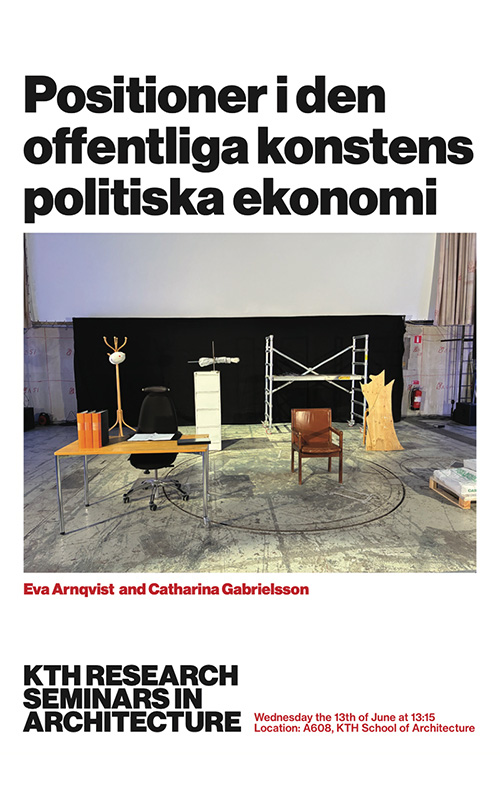Positions in the political economy of public art

We will be ending the Research Seminars in Architecture series spring semester 2025 on the 13th of June, with a presentation by Catharina Gabrielsson and Eva Arnqvist. Drawing on their Formas-funded project Positioner: Den offentliga konstens politiska ekonomi, they will screen excerpts from a research-based film and introduce a framework for understanding the conditions of public art in Sweden. Join us for a conversation on art, democracy, and the contradictions of Gestaltad livsmiljö.
Tid: Fr 2025-06-13 kl 13.15 - 16.00
Plats: Conference Room 6th Floor of the Architecture School Room A608
Videolänk: https://kth-se.zoom.us/j/67185547897
Public art in Sweden is an expanding field. The increasing amounts of projects, professions and competences involved in the production of public art reflect the significance of the “creative industries” for economic growth, but is paradoxically also revealing for the disinvestments in culture that have been ongoing for decades and has run in parallel with the growth of bureaucracy – a combination that carries the unmistakable traits of neoliberalism. Our interdisciplinary, artistic research project Positioner: den offentliga konstens politiska ekonomi (Formas 2021–2024) is a forage into this field, motivated by the need to investigate the real-life propensities for meeting the aims of Gestaltad livsmiljö (2017). Rather than focusing on actual artworks, the project is centred on the background conditions of possibility of public art, employing it as a lens to detect (what Nancy Fraser called) “actually existing democracy” in starkly different, localized situations. By adopting a broad conception of public art – from commissioned art projects in predominantly urban spaces, to self-organised site-specific art projects in predominantly rural regions – we have initiated a mapping of a highly differentiated and heterogenous field, mirroring the uneven distribution of resources in an increasingly divided country.
The project has two principal outcomes. One is a moving image re-presentation – somewhere between a filmed performance and a reading enactment – based on empirical data on the work life conditions of actors involved in the production of public art; an understudied area that has not yet been considered in the discourse on public art. The other is an analytical framework that allows us to better capture the varying contexts or spheres in which public art comes about; three “positions” made up of an assemblage of actors, influences, resources, aims and forces that generate different artistic outcomes and effects. At the seminar, we will make a preliminary presentation of the project’s outcomes that are aimed to provide a platform for a conversation on art, democracy and sustainable development – but also on artistic research methods and forms of dissemination.
BIOS
Catharina Gabrielsson is docent in architecture and professor in urban design and urban theory. Her research centres on the relationship between architecture and the city, critically questioning and contextualizing modes of spatial production by juxtaposing aesthetics, politics and economics. Together with colleagues, she has edited several research compilations such as Instituting Worlds: Architecture and Islands (Routledge, 2025) and Neoliberalism on the Ground: Architecture and Transformation from the 1960’s to the Present (Pittsburgh University Press, 2020). With Helena Mattsson, she is at the final stages of preparing a co-written monograph on Swedish postmodernism (Makadam, forthcoming) and a collection of her own essays, Housework (Glänta, forthcoming).
Eva Arnqvist is an artist, researcher, and educator trained in both the arts and political science. Her work spans a wide array of media and practices, focusing on questions related to the production of place, knowledge, and everyday life. She has extensive experience in critical and practice-based urban research and has initiated several collaborative DIY art projects. She is co-founder of the artist studio collective and exhibition space Slakthusateljéerna (Stockholm) and has produced several artist’s books of which her forthcoming Positionsförflyttningar is a critical investigation of the transitioning of Kosta in Småland, from a glassworks community to experience economy. Besides her artistic practice, Arnqvist works as a public art consultant and is a member of the board of the public arts foundation Eva Bonniers Donationsnämnd.
